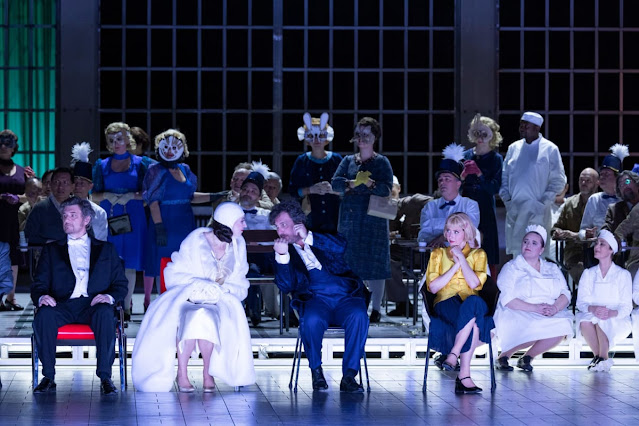Paris Opera (live stream), 30/03/2023
Thomas : Hamlet
Chorus and Orchestra of the Opéra National de Paris
Pierre Dumoussaud
Ambroise Thomas's uncertain reputation as a composer has certainly been considerably polished these days. Mignon is not his only legacy, and institutions like the Palazzetto Bru Zane are doing remarkable work in restoring his oeuvre in recordings and performances of very high quality. There is, however, still a certain resistance, I think, to Hamlet in Anglo-Saxon territories, because there's this sense that he was tampering with the sacred Shakespeare. Effectively, while not exactly giving it a happy end, Polonius, Laertes, Gertrude and Hamlet himself all survive in this version - something Thomas and his librettists Carré and Barbier took from French stage adaptations of the play that were in circulation at the time. Yet when you experience it, and particularly with a musical plateau of this distinction, there's no denying its quality and dramatic strengths.
The advantage of a production like this new one at the Paris Opera is to take the piece right out of its context, which allows the viewer to shake off the traditional expectations. Krzysztof Warlikowski places the action in an asylum of monumental metal grid walls, set roughly perhaps in the early 50s, with Hamlet as the principal inmate, but also an elderly, wheelchair-bound Gertrude. It quickly becomes evident that the characters who appear in the first act are aspects of Hamlet's imagination, memories and fantasies, and then before the curtain goes up on Act 2, words appear on the scrim, "20 years earlier". Some of these scenes still contain elements of the asylum, but others seem more straightforward, without so much of that disruptive element. At the end, we come full circle, back to the opening scene, as Hamlet takes on the reverse image of his murdered father in realisation of his obsessions and where they have led.
As Hamlet's sanity, or lack thereof, is a consistent issue in the play, the setting does not shock, and Warlikowski delivers an interpretation of considerable force and feeling, enhanced by beautifully managed direction of the actors to which they have adhered without hesitation. There are a few details that jar briefly (why is the old king's ghost seen as a white clown?), but the overall vision is so compelling, as are the performances overall, that they are simply absorbed into the flow. More than that, despite the modern and potentially incongruous setting, Warlikowski respected the grand opéra tradition of the work, even keeping part of the ballet.
 |
| L to R : Jean Teitgen (Claudius), Eve-Maud Hubeaux (Gertrude), Ludovic Tézier (Hamlet) and Lisette Oropesa (Ophélie) Hamlet, Act 2, scene 2, Opéra Bastille, March 2023 (© Elisa Haberer/OnP) |
There can be no denying, however, that this production works as well as it does not just because the staging is interesting, but because it is led by an utterly superb performance from Ludovic Tézier in the title role, as much dramatically as vocally. He is, right now, at the height of his powers, and this is a vehicle that gives him the opportunity to show off every one of his qualities, and they are many. The physical delivery matches the vocal one, and the vocal one is truly exceptional. The timbre is bronzed and luxuriant, highs and lows equally easy, the vocal lines seamless and fluid, the range of colour and expression is tremendous. It's a big role, Hamlet is on stage and singing for the great majority of the work, which is not short, and Tézier looked drained as he took his curtain calls, but the great roar of applause that greeted him was the only possible response to such a stellar performance.
It was a performance that cast rather a heavy shadow over the rest of the cast, and it's to their credit that they all managed to make their mark alongside Tézier. Lisette Oropesa was Ophelia, with a slightly heavier voice than one usually hears in that part, which has a famous Mad Scene. Oropesa negotiated the coloratura and high notes with her customary ease, and that lovely silvery tone, and the extra weight in the voice gave an additional warmth to the character; the first act duet with Hamlet was particularly beautiful. Eve-Maud Hubeaux brought her fruity mezzo to Gertrude, and a subtly judged, twitchy demeanour to her character, suggestive of extreme nervous tension and perhaps some substance abuse (although the only substance seen being abused on stage was cigarettes). The confrontation with Hamlet in Act 3 was excellently handled, grippingly dramatic. Jean Teitgen's strong, dark bass was ideally deployed as Claudius, very controlled, but with fear deep at the core. All the other soloists were just as reliable, and between soloists and chorus, what a pleasure it was to hear the libretto delivered with such clarity.
The ensemble was conducted by Pierre Dumoussaud, who appears to be turning into something of a 19th Century French music specialist. At any rate, he delivered Thomas's score with plenty of colour and attention to detail, and a real feel for the style, providing a vibrant and alert support for the singers. This was a truly high quality evening, with an opera that deserves this kind of attention and this calibre of production, and delivered on every level. A triumph, by any definition.
[Next: 21st April]
